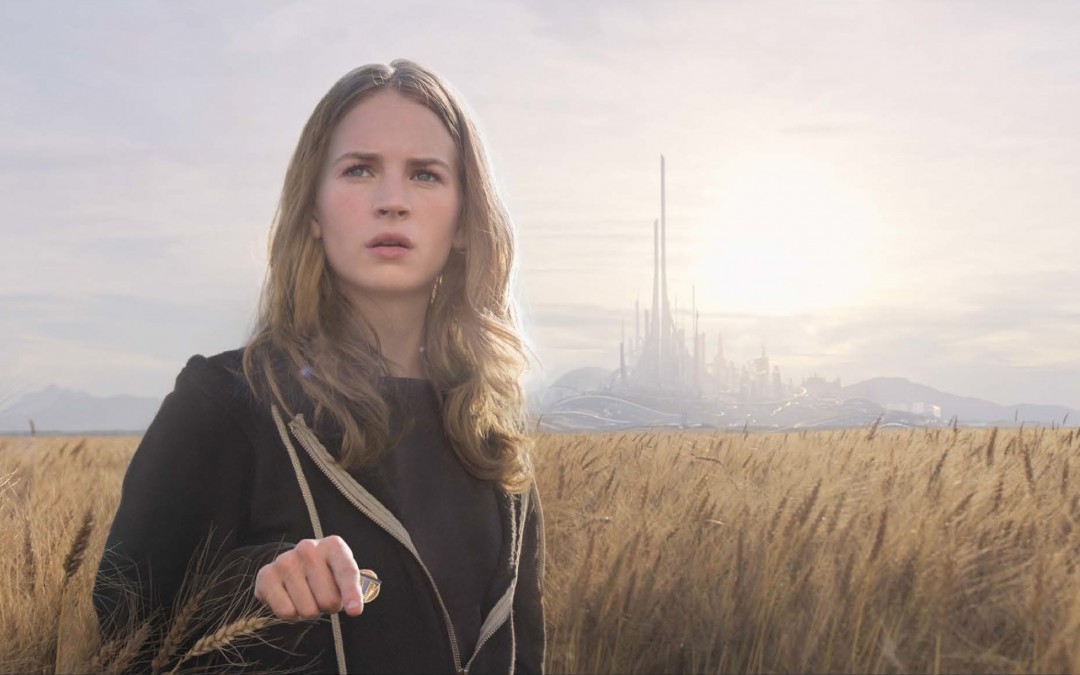Hollywood’s habit of prioritizing franchise reboots, remakes, sequels, and/or big screen adaptations of lucrative IPs from other mediums (novels, comic books, video games, etc.) over original content is something that movie buffs seem to decry on a daily basis. Yet, there’s a reason that big studios keep going back to the same wells, over and over. In 2014, for example, only two of the top twenty-five films at the worldwide box office were non-sequels/remakes not based on any pre-established material (Interstellar and Lucy) – though, depending on how you look at it, The LEGO Movie also counts.
Tomorrowland, like The LEGO Movie, is technically an original feature film, in that it’s a fine example of synergy (being partly inspired by the Disney theme park attraction of the same name); yet because the original IP doesn’t actually have a strictly defined plot, Tomorrowland story writers Jeff Jensen and Damon Lindelof were free to develop their own premise and mythology for the movie. However, for the time being, it doesn’t look as though the Brad Bird-helmed tentpole is going to be another Pirates of the Caribbean success for the Walt Disney company.
Bird’s $190 million-budgeted Tomorrowland has a softer than expected opening weekend at the U.S. box office over Memorial Day weekend 2015, where it took in just under $42 million. That’s a better turnout than the openings for John Carter and The Lone Ranger – the Mouse House’s infamous financial duds from 2012 and 2013 (respectively); yet already, Tomorrowland has restarted the conversation about Hollywood’s “originality problem,” as Variety calls it. For case in point, read Disney’s distribution chief Dave Hollis’ statement about Tomorrowland and its box office prospects:
“‘Tomorrowland’ is an original movie and that’s more of a challenge in this marketplace. We feel it’s incredibly important for us as a company and as an industry to keep telling original stories.”
Question is, are original Hollywood movies really that much more of a challenge to sell in today’s film market? Or is that something of a self-fulfilling prophecy, as a result of how major studios approach such projects?
Tomorrowland may be a non-sequel, but it did have its connection to Disney’s theme parks to bring it attention. Similarly, the film’s U.S. marketing leaned heavily on George Clooney’s involvement (even though he shares protagonist duties with Britt Robertson) and Bird being the same guy who directed The Incredibles and Mission: Impossible – Ghost Protocol, as selling points. Yet, the film’s trailers and commercials were often criticized for being too low-key when it came to making Tomorrowland look like a must-see blockbuster. So, when the mixed reviews started trickling in almost a week ahead of its release, that certainly didn’t help to win over moviegoers who were on the bubble about whether or not to give Bird’s new feature film a shot.
Compare that to what happened with Mad Max: Fury Road, which arrived a week before Tomorrowland. The Mad Max brand has cult appeal, but there’s a whole generation of younger filmgoers who’d never even heard of George Miller’s previous installments in the series before Fury Road (even a fair number of older moviegoers were only vaguely familiar with the franchise, for that matter). In that context, the promise of a return to the Mad Max film universe might’ve not sounded any more interesting than a Tomorrowland movie directed by Bird, to a lot of people.
Yet, the combination of a strong marketing campaign and fantastic early word of mouth propelled Fury Road to an opening weekend slightly higher than Tomorrowland‘s. Now Miller’s $150 million “gamble” has already made back its budget at the worldwide box office (and then some), while Bird’s movie may struggle a bit to do likewise over the next couple weeks (especially once Jurassic World hits theaters).
